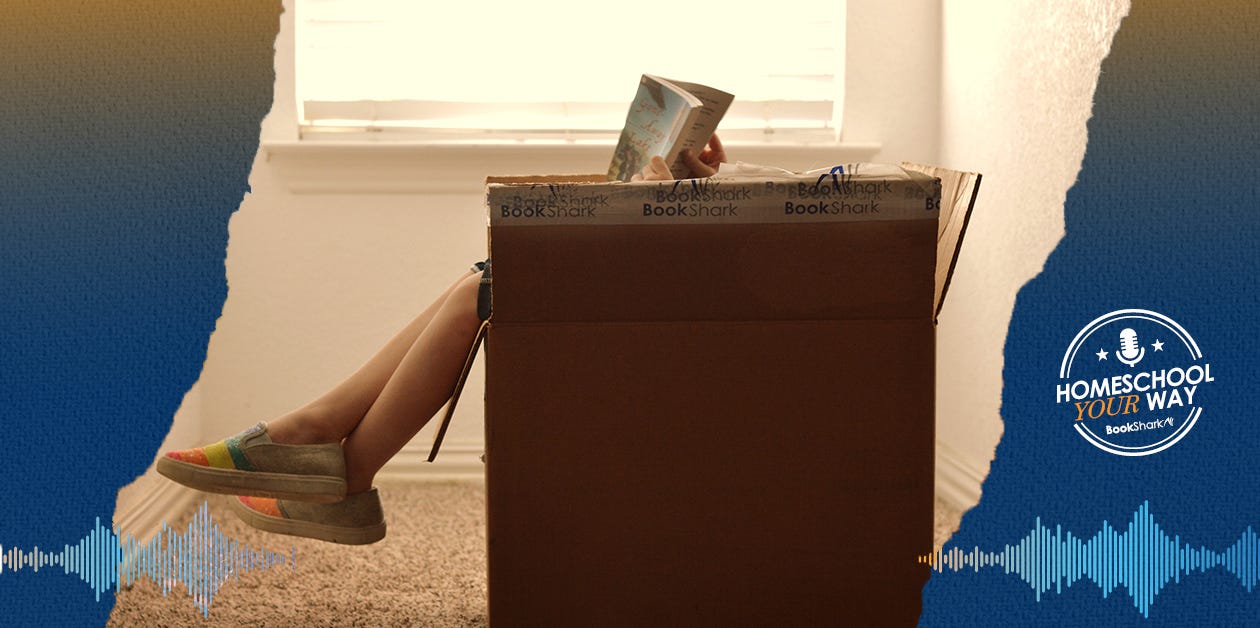Helping Kids with Executive Function, Bilateral Skills, and More
-
 By
BookShark Homeschool Curriculum
By
BookShark Homeschool Curriculum
- Sep 13, 2022

In this second chat with Occupational Therapist Assistant Trish Cauthon, she and Janna delve into the many facets of executive functioning and how to support your child with those skills. Find out what trouble signs to look for in areas such as visual processing, bilateral skills, and fine motor skills. Trish shares simple strategies that can help as you guide your child without frustration through developmental milestones.
Listen to this podcast episode
Podcast Transcript
Janna Koch (00:36): Welcome to Homeschool Your Way. I'm your host and BookShark's community manager, Janna Koch. In this episode, I resume the discussion with Trish Cauthon, a certified occupational therapist assistant. She has spent decades working with children in the public and private sectors, helping them reach their full potential in school activities and much more. If you missed the first half of this dialogue, be sure to check out part one and then subscribe to Homeschool Your Way to ensure you never miss an episode.
Janna Koch (01:08): Let me share a homeschool hack from Lindsay Lewis, BookShark's own Virtual lead. Give your kids age-appropriate chores. Un-stress by teaching your kids to help out around the house. They're part of the family. Lindsay's children are six and eight. They load and unload the dishwasher, load the washer and the dryer, fold the clothes and put them away, clean rooms and bathrooms, and sweep and mop. In the long run, training your children to keep house will benefit everyone's future self. If you have a hack you would like to share, please go to BookShark.com/podcast and leave a comment.
Janna Koch (01:50): Let's jump in, as I ask Trish about executive functioning and why children need it in order to follow the steps of any problem solving equation. We're going to learn how an obstacle course can help your child learn, plus tips for helping your child achieve success in areas they might be struggling in.
Janna Koch (02:10): I'd like to get back to this idea of executive functions, because sometimes I look around and I think there's a lot of adults who are even struggling in this area.
Trish Cauthon (02:21): Very much, yeah.
Janna Koch (02:21): Explain to me what this concept is and how it is in our children and how we can help them develop it.
Trish Cauthon (02:29): Okay, yeah. Even though I've been doing this work for as long as I have, I even still struggle with recognizing and just really giving enough credit to executive functioning. It's a newer term; I didn't learn about it in school. I think it's an evolving thing, although we've done it for, people have done it since the beginning of time. But now they're putting more words and areas into the executive functioning. But basically, in a nutshell, it's being able to think adaptively, problem solve if something unexpected happens, being able to see something from someone else's point of view. That's just that thinking piece and then there's the planning piece. You have to be able to plan and know where to start. We talked about that earlier. What sequence am I going to do? What tools am I going to need? What supplies?
Trish Cauthon (03:20): Just knowing even how to regulate yourself to even be able to get to that point where you can even plan. And then self-monitoring is assessing, stopping and being like, is this working? Is it not working? What can I do about it? And even recognizing and being able to calm yourself down long enough when you're frustrated to be able to step back and be like, “What should I change?” That's super important; that's that self-control piece. If it doesn't work one time, am I just going to tear it all up and throw it on the floor and stomp on it and leave? Or am I going to be like, “Take a deep breath, I'm going to try it again.” But monitoring yourself. And that can be super hard, especially nowadays. We're just seeing this as incredibly challenging for so many people, adults, children, across the board, is that self-control piece.
Trish Cauthon (04:15): And then you need working memory. You need to be able to retain what you've learned and be able to pull it back out. Next time you see that same event happen, in whatever it was, whatever task you're doing, you see the same thing happen. You have to remember, you have to be able to remember like, “Oh yeah, this happened two weeks ago when I was doing this. And this is what I did about it, and it worked and so I'm going to do that again.” A lot of the times, working memory is really tough for a lot of kiddos. It's hard to pinpoint that that's an area, but it's a definite area.
Trish Cauthon (04:52): And then of course, time managing, managing your time, knowing how long you're going to have, time restraints. And then you get frustrated because, oh no, I'm not going to get done. And then everything just falls apart. There's ways to help your kiddos learn how to manage their time and little organizers help. The cotton ball thing I talked about earlier, even like, okay, I'm going to get five tasks. I'm going to do five cotton balls in one hour and that's going to be my goal. And I'm not going to think about it from start to finish, but breaking it down in that way. That's kind of in a nutshell, a very big word with a lot of working parts.
Janna Koch (05:30): It's a lot of pieces. I remember as a kid, we used to play games all the time before electronics were a thing, when you'd have to take those long car trips with your family. We would use the alphabet and then pick a category. If it was fruit, we'd say apple. And then the next person would say apple, banana. And then apple banana, cherry. You keep going. And so really hearing you, I'm like, “Wow, I really helped myself in that memory area because we would play these types of games.” And so you'd be working on your memory and it wasn't even anything, our parents were like, now we're going to play the memory game. It was just creative ways to keep ourselves from being bored.
Janna Koch (06:09): But I think because kids have access to things electronically, which I'm not saying is a bad thing at all. I wish I had had a GameBoy when I was a kid on those long family trips like my other friends did. But because those other things are more accessible now, I think as parents, it's our job to make sure that we are working on some of those skills to help them develop them because they're not as natural, maybe, as they used to be. Because we don't have to, even as adults, we can remind ourselves with the calendar. We have electronic things that beep at us and say, “Oh, by the way, you were supposed to do this.” And even now my kids laugh at me because I'm just running into the grocery store. And I just count on my fingers and give each finger an item. And inevitably I come out with more than I said, but hopefully I don't ever forget what I'm saying.
Janna Koch (07:01): And my daughter's like, “You can speak it right into your phone.” And I was like, “Yes, but my phone is not going to help me in my old age. I need to keep exercising that muscle memory.” And so I think we kind of forget that our kids don't even have that developed yet and that we need to be facilitating that even now. Talk about the steps, talk about the steps in order. Because when they go to do higher processing subjects like math, they're going to have to remember the steps in order to do the task properly. And so making it fun now with little games is more advantageous than trying to tell 16-year-olds that, “What do you mean you don't remember the formula? That was the whole point of the class you sat through.”
Trish Cauthon (07:55): Obstacle courses are very good when they're young. It just has a really fun way to incorporate, and you can incorporate that into your studies. They have to navigate and plan and then you tell them how to do it differently. And then you can add in, “Okay, now I want you to tell me a word that starts with the letter B every time you get to that point or whatever it is you're learning.” Or get to the new spot when you're jumping around and moving and going under and over and working on those tasks, whatever the academic task is. But while they're actually moving and thinking about where they're going to get to that next set step or how they're going to get there, that really wakes the brain up too, as far as retention.


Janna Koch (08:43): I like that.
Trish Cauthon (08:44): It wakes the brain up.
Janna Koch (08:44): I like that. That's a good one.
Trish Cauthon (08:44): Yeah.
Janna Koch (08:48): All right. Well, let's just do a quick overview of reading and writing. What does that look like? Again, I'm kind of saying in our children's brains, because I think this is a kind of crash course for parents to understand how their child is developing and when you're homeschooling, it's not just presenting them with information. It's helping them learn how they learn, understanding it, and then retaining the information. When we're looking at reading and writing, what kind of skills should parents be looking for? And maybe some examples of how we can help our kids with those skills.
Trish Cauthon (09:31): When a kiddo's young, ages three to five or so, is when they, as far as learning letters, for instance, learning to write their letters and their numbers, that's always huge. It's such a huge deal. They're already writing, or they already know all their letters. And so, we're just going to start right into spelling words or whatever, or jumping to that next step. Really just looking at the development. And I mean, there's all kinds of online tools that you can just look at as far as development of the visual system. Letters are very visual. They're basically just a bunch of lines connected together. So knowing, to be able to recognize your letters, needs to come before you actually write them. You have to be able to do your pre-writing shapes. That's super important, and a lot of kiddos we see are pushed too fast to write their letters before they even know them, or to write words before they've learned how to write each individual letter. There's a lot of research behind the uppercase/lowercase and which order you should do it in.
Trish Cauthon (10:44): And lots of building things with their hands, so actually creating a letter out of their hand. A lot of that, before you even want to think about connecting letters and forming words, and then connecting words to form sentences. If you can focus on doing it in the developmental order, when the child's actually ready, they're going to get it. It's just going to happen naturally because they're doing it in the right order. It's going to decrease the frustration a lot. Super basic way to try to talk about letters and numbers and that type of thing.
Trish Cauthon (11:20): We already talked about tactile earlier, but another thing as far as motor skills, that's primarily what we focus on a lot in my work. If there is a component to a task where you can see that your kiddo is physically struggling just to even use their two hands together for some reason, or just seems to be not quite working, their body isn't working, their two sides, aren't working together, they're rubbing their eyes a lot. You might want to consider that it could be a motor issue. It could be a motor piece that's missing, making it super frustrating because they're just wondering why their body can't do what other … “Why can't I do this task like my friend is doing it?” It's kind of looking and watching and the way they approach a task. And it's hard to basically take my field and break it down that much, just being aware and looking for those signs of frustration.
Trish Cauthon (12:26): Definitely vision is a huge thing, especially with all the media that kids are using nowadays. There's a lot of visual delays that kids are having from too much screen time, too much time like that. Just focusing, their eyes focusing on one thing and then when they have to go and then taking the whole environment with their eyes, that sometimes they really struggle with that. Kids sometimes don't even have peripheral vision because they've focused so much on one point, like a screen or that type of thing. So, just being aware, I guess, of your kiddo looking like they're struggling with anything and talking to their pediatrician or talking to your friends, that might be a good resource too. And like, "Hey, does your kiddo do this?" Might be a good reference point.
Janna Koch (13:20): Good. I had heard it said once before, and maybe you can validate this or invalidate it, but that I believe it was, they don't even start to try to get children to read if they can't do the monkey bars. So, this idea that if they can't cross their hands over, if that connection isn't there motor skill wise, then there isn't going to be the ability there then to start that reading because of what it takes in their brain.
Trish Cauthon (13:48): Yeah. No, that's definitely supported. And that's just a bilateral, bilateral skills that we have. And it's neurologic too, you learn to use both sides of your body. There's asymmetrical, symmetrical, reciprocal, that can be delayed and then that message isn't necessarily reaching the brain. And then the perceptual part of the brain that then spits it back out and actually makes sense in your head, in your eyes, to actually be able to start learning to read. Also affects a lot of other things like writing and structuring tasks. So definitely bilateral skills are huge. And there's great resources online too, for how to incorporate specific bilateral skills into your kiddo's earlier years, or even later years, they can struggle with that. And it's always something that you can work on and that they can learn. It's never too late, even if there is a piece missing, it's never too late for a child to then learn that piece and things hopefully get easier.
Janna Koch (15:01): Well, that's a relief, I think, as a parent to know that if maybe you've pushed and your child has maybe adapted well without that piece, that when you finally do recognize there's a piece missing, it's not too late. You didn't wreck them, there's still hope that you can go back, find that piece, plug it in, and it's only going to make things better for your child. And so, it's not hopeless, there is always hope and our brains are amazing, amazing things.
Trish Cauthon (15:36): They are.
Janna Koch (15:36): I love to talk to parents and say, “Have you ever done one of those visual Facebook or puzzles where half the words are missing, but your brain reads it exactly the way it was intended without the missing words?” It's phenomenal that our brains can do that. We recognize patterns that … So a lot of times with children, they can cope really well. They are high functioning, even though they have missing pieces. And then I think, when they're in group settings, it's easy, then, for them to get pushed onto the next thing. But then when a parent brings a child home, and they sit down in their individual setting, and they start to see that some of these things aren't lining up. And they're like, “Nobody told me I had no idea.” Well that isn't pointing fingers at anyone. It got missed. Now you have this great opportunity to figure out what part is missing and then, I hate to say fix it, because I don't know, as a parent I don't want to try to think that I have a ton of things I have to fix, but knowing that I won't be able to fix it. But able to adapt and just make it so that they can have the most success in their school years and then beyond. That's a great word of encouragement, Trish.
Trish Cauthon (18:48): Yeah, so about the monkey bars and the bilateral coordination piece, there's also just a couple more quick areas that we work on a lot. And it may be an area that, unless you're trained to notice it, you might not notice or recognize that it's an area to help your child with. But one of those would be just general hand strength and grasp and that would be just fine motor skills in general. And one really frustrating piece that we see with kiddos a lot when they're learning to write, if they can't hold a tool yet properly, or they're made to hold a pencil too early, before their hands are actually developed to hold a pencil, they're going to develop pretty bad habits like weakness, pain, they're going to fatigue super quickly.
Trish Cauthon (19:38): Looking at the fun tools that are out there for grasp, starting with, if you think about the arches in your kiddo's hands, you want the tools to fit their hands. If they're tiny and their little hands are not super strong yet, you're going to use fatter, bigger tools that they can actually control. And a lot of that's pretty common. You see a lot of the fun... Crayola puts out a lot of awesome little pre-K type gadgets, but there really is a lot of sense to following that developmental progression and not just expecting your kiddo to be able to use a pencil when they're three years old or four years old because it's just going to make them frustrated. Even if they can, it doesn't mean they should. Some kids can, but just better to stick with the age appropriate-type, fun tools like that.
Trish Cauthon (20:30): And then just one other piece would be the vision piece. We work a lot on that. Say your child might be struggling to keep their place when they're reading and their eyes are skipping all around, and that type of thing. You can explore different colors. Sometimes just putting a colored overlay over the text can help them to attend and actually help them to be able to scan better and not lose their place as often. And then another just simple, super simple thing that we don't even think about, would be take an old notebook and make a little window for either one word at a time or one line at a time, and then just actually sliding that down as they read. That's just one piece that we use a lot and can help kids tremendously with not losing their place. Because sometimes eyes just don't, your eyes don't team well together. And that can be frustrating because you don't always know; a kiddo doesn't always know that's happening.
Trish Cauthon (21:37): So, just different strategies like that to think about for reading, just helping reduce the visual clutter that you can oftentimes get, especially with a lot of text. So, different kinds of paper, different lines, different thicknesses, those types, just look and explore some of that can help kids be more successful.
Janna Koch (22:01): That's good. That's really good. I think it's stuff that again, as a parent, I just didn't ever think, what do you mean? This is the paper, use the paper you have. What's the problem? And I know you're not supposed to say to your kids, what's wrong with you? I fail miserably with that. I still, and then I now preface it, I know I'm not supposed to ask what's wrong with you, but what's wrong with you? And then the girls will say, you're not supposed to ask that. I'm like, I know, but I don't, what's wrong with you? But really nothing's wrong with you, you just haven't developed it yet. And I say, it's the same principle, you don't know what you don't know. For parents, you don't know that your kid was struggling and that you could have, there are other things, but if you know now, you know better, you do better.
Janna Koch (22:44): Your kids don't know what they don't know. They don't know why they can't focus on the page and get done with their reading or these different tasks that we ask them to do. And sometimes parents will assume it's the curriculum. They'll assume, a lot of times kids will say they're bored, well really, they're lost. And so it's an easy answer. "Well, I'm just bored. Well, this is stupid. I don't want to do this anymore." And the parent will rush and change curriculum, but it really may not be what's being presented, but how it's being presented.
Trish Cauthon (23:16): Definitely, yeah.
Janna Koch (23:16): And so the more we know as parents, the better we can adapt things and help our children. Speaking of what we know, kind of give us an idea of a process. If I'm a parent who maybe has just this sixth sense that a child isn't getting something that maybe I think they should, and that's not a comparison. They should be at a certain place because their brother did it at that age or... It's a genuine concern. At this point, their child probably should have been able to master this task and they just haven't yet. How would you guide a parent who's been feeling that way, but unsure of what to do next?
Trish Cauthon (23:56): Well, I would say, definitely just become aware of the developmental steps that each age, you could look online and there's great resources online for where a kiddo technically, what milestone they should be reaching at it. And the age ranges are not concrete. I mean, that's why there is a big range, because every kiddo develops differently. But if you find that they're just still not meeting it, even at that end range and still not getting it, definitely just, pediatrician. And oftentimes we've found through parents, is that you have to really push sometimes, especially with vision and motor pieces. They're looking at them a little more quickly and more at the bigger picture, but you're seeing the smaller broken down pieces. So, if you can break that down for the pediatrician and be like, this is exactly the area.
Trish Cauthon (25:04): And then sometimes even just asking for a referral, you can get referral to outpatient therapies. There's obviously speech therapy, OT, PT, but there's the outside outpatient. And they definitely support school learning as well, very, very well as school based OT too. That's your best resource, but definitely be educated when you go in so you know specifically what you're seeing and how, so that the pediatrician... Because they just know these little snippets of your kids. They see a tiny window. Most pediatricians will be very, very receptive to that, so yeah.
Trish Cauthon (25:48): And the vision piece can be very, very tricky. There's developmental ophthalmologists. You can specifically look for that type of eye doctor to take your kiddo to, who specializes in young children. If you think that there's something vision related going on, that can be very hard to pinpoint.
Janna Koch (26:13): Sure, yeah. Well I do know that if homeschooling parents are anything, they are champions for their children. So, that is a great resource to know what the next step, if they need any help. Trish, I appreciate you being on today. I know our listeners have appreciated it as well. Thank you for all the good information.
Speaker 3 (26:32): That's all for this episode until next time. Bye.










